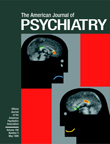To the Editor: Douglas F. Zatzick, M.D., et al.
(1) have confirmed the well-known empirical observation that posttraumatic stress disorder (PTSD) “may well be the core disorder contributing to any observed functional impairments or diminished quality of life” (p. 1694). As the authors indicate, their findings are not limited to combat veterans but—other things being equal—may apply to a civilian population, in keeping with DSM-IV (309.81).
In a career spanning over six decades, I have seen thousands of people receiving disability compensation. On the basis of this experience, I propose the following statements:
1. Neither the symptoms nor the management of PTSD has changed in the 150 years since the courts of law became involved; only the names have changed: railway spine, Erichsen’s disease, traumatic neurosis, accident neurosis, compensation neurosis, litigation neurosis, or chronic or delayed PTSD.
2. In no other psychiatric disorder are as many professionals involved as in PTSD: physicians in various specialities, including psychiatry and neurology, psychologists, lawyers, social workers, chiropractors—to name but a few.
Friedrich Jolly in 1897
(2) and Albin Hoffman in 1891
(3), among others, stated that it is not the often trivial accident but rather the law that triggers the development of this condition, and Hoffman recommended changes in the law rather than medical treatment. In 1974, I coined the term “nomogenic disorders”
(4,
5) to characterize psychopathological conditions created, enhanced, and perpetuated by the law and its application and to denote the psychological and social consequences of the law in the way it affects the course of the disease. My experience confirms Zatzick and associates’ findings of the often disastrous consequences of PTSD, the way it affects a person and his or her environment, and the futility of any type of treatment of a condition that is not medical but social and legal. Following the resolution of a claim, the person with PTSD maintains the sick role. Bursten and D’Esopo
(6) described this as “the obligation to remain sick.” This also applies to pain, described by F. Dudley Hart as “an old friend”
(7). The search for further medical attention is abandoned.
In my opinion, the only rational approach is prevention, which consists of shortening the entire compensation claims process from the outset. The medical profession contributes to the complex process by applying countless tests and therapeutic methods in the misguided intention of helping the patient, thus making PTSD an iatrogenic disorder.

